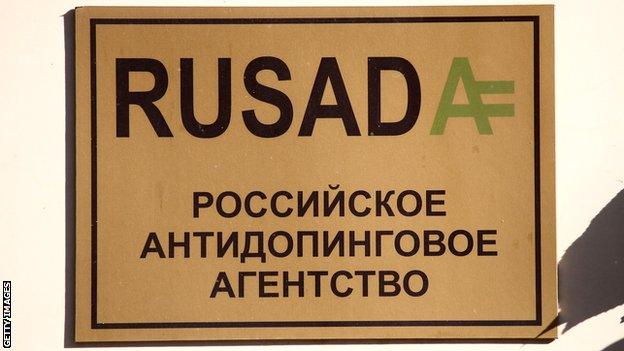Russian doping: Head of key Wada panel defends waiting to decide on next action
- Published

Russia could now be at risk of another ban from international events
The head of a key World Anti-Doping Agency panel has defended waiting until mid-January before deciding what action to take after Russia's anti-doping agency missed a deadline to hand over data from its Moscow laboratory.
Rusada was given until 31 December to comply, but Wada's inspection team were denied full access to samples.
Wada's compliance review committee (CRC) could recommend Russia is suspended again when it meets on 14 January, with the country having only been reinstated in September.
Some athletes and anti-doping organisations have demanded the panel convenes immediately, with Wada vice-president Linda Helleland calling on the agency to act "rapidly."
But CRC chairman, British lawyer Jonathan Taylor QC, has now explained the process.
In a letter he sent to British Paralympic power lifter Ali Jawad, Taylor said the meeting was scheduled "to ensure that there was time for a full report to be provided by the Wada compliance taskforce and considered by the CRC in advance of the meeting, setting out the position and explaining the reasons for any non-compliance".
He added: "In addition, in cases of non-compliance, the special fast-track procedure also requires Wada to give the Russian authorities a fair opportunity to make a submission for the consideration of the CRC.
"It might be said that there is nothing to be considered, the non-compliance is plain, the reasons are irrelevant, so following due process is futile and therefore unnecessary, but the courts do not like such arguments, and therefore the risk of successful challenge would be significant, which I don't think anyone would want.
"With respect, I don't think that this approach 'lacks urgency'. I note your concern that waiting till 14-15 January might give the Russian authorities a further opportunity to provide the data, albeit after the deadline set.
"I am not sure why you think that would be such a bad thing. I thought everyone agreed that it is vital to get the data, so that it can be determined which of the athletes tested in the relevant period have a case to answer and which do not."
Taylor said "that imperative is what drove" the CRC to recommend the reinstatement of Rusada in September, after a three-year ban that followed state-sponsored doping scandal.
He added: "If it is achieved, that is presumably a good thing, isn't it, whether it happens on 31 December or next week?"
Wada president Sir Craig Reedie said he was "bitterly disappointed" after it was confirmed Rusada had missed the deadline, having previously said it was "very hard to believe" Russian authorities "won't deliver".
On Wednesday, Wada's athlete committee said it was "extremely disappointed" the deadline was missed and that it expected Russia to be declared non-compliant following the process recommended by the CRC.
How the scandal unfolded
December 2014: As many as 99% of Russian athletes are guilty of doping, a German TV documentary alleges.
November 2015: A Wada commission publishes an independent report alleging widespread corruption, amounting to state-sponsored doping in Russian track and field athletics. Rusada is declared non-compliant.
May 2016: Former Moscow anti-doping laboratory boss Grigory Rodchenkov,, external who has turned whistleblower, says dozens of Russian athletes at the 2014 Winter Olympics in Sochi had cheated.
July 2016: Russia operated a state-sponsored doping programme for four years across the "vast majority" of summer and winter Olympic sports, says a report from Professor Richard McLaren.
August 2016: International Olympic Committee (IOC) decides against imposing a blanket ban on Russian athletes at the 2016 Olympics in Rio. Individual sporting federations rule instead, with 271 Russians competing.
December 2016: Wada publishes the second part of the McLaren report which says more than 1,000 Russian athletes benefited from doping.
January 2017: Rusada and Russian sport authorities given list of criteria, external to achieve before winning back recognition.
March 2017: Wada says Russia's anti-doping reforms are not happening quickly enough.
February 2018: Russia are banned from competing at 2018 Winter Olympics in South Korea by the IOC, but 169 athletes who prove they are clean allowed to compete under a neutral flag.
May 2018: Wada writes to Rusada offering 'compromise' solution.
September 2018: News of the compromise, revealed by the BBC, prompts fury from athletes and doping bodies.